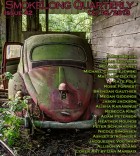The voice in this story is what catches my attention first. Do you feel like this story represents your voice as a writer or was this a departure for you?
I was trying something different with voice in this story. I often write in the first person, but usually my narrators are a lot more verbose. With this story, I wanted each of my narrator’s sentences to be fully loaded. I wanted an abrupt storytelling voice, rather than one that lingers.
There’s both a humor and a sadness to this piece that I connected with as a reader. That combination tends to be something that draws me into stories. When you were writing this or any other of your stories, do you find you strike this balance often?
Yes, it’s definitely go-to combination of tones for me. I also enjoy humor combined with the bleak, as in a novel like Molloy or a film like Fargo. And what I like most of all is a narrative that can go through any number of moods and tones while still retaining a fundamental sense of humor.
In a piece like this the “story” is pretty abbreviated. The events are simple. A narrator tells you a little about his/her life with a hoarding mother/family. That’s pretty much the extent of the narrative. What makes it notable is the depth of the character that you create in a such a small space and just how the actions are rendered within the voice. Can you talk a little about how you understand what a narrative is or can be?
I guess narrative is basically the account of living in time. Each moment can be a kind of narrative in itself—”she woke up, she got a burger out of the fridge”—but it’s also linked to any number of underlying narratives, such as “the story of her life” or “the state of contemporary America.” The lowest common denominator of all narratives is life itself: existence in this particular reality of ours. Personally, I’m pretty old school in my belief that stories can teach us some kind Truth about reality. But it’s a kind of truth that contradicts itself endlessly, and maybe that’s why we won’t ever stop telling stories: stories at every shape and scale—a page of Diane Williams, a thousand pages of Rabelais—are expressions of Truth. I hope that doesn’t sound too new-agey or mystical.
Do you have any writing rituals? What type of pen (or pencil, or computer…) do you use? Special or not special notebooks? Are there any superstitions you tend to follow even when you think, “Ah, that is hooey!”?
I tend to write on computer. But when I hit a block I dive into all manner of procedural writing practices involving notebooks, scissors, scrabble tiles, Google, junk mail and old manuscripts. I write five days a week because I will go crazy without a break. And usually ideas come to me during my breaks.
What are you reading right now? Or, alternatively, what have you read recently that really knocked your socks off?
Last night I read the first half of the new Cesar Aira translation, Shantytown, and was thrilled as per usual. Its focus on wealth disparity reminds me of the previously translated Ghosts, but it also the zany genre mash-up vibe of The Literary Conference. And speaking of abrupt storytelling voices—Aira is the master.



 Included in the price of SmokeLong Fitness:
Included in the price of SmokeLong Fitness: